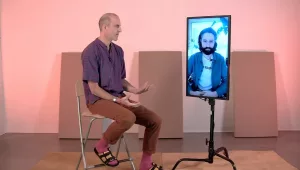
Blockchain + DAOs
From NFTs to governance structures, blockchain technology may be a glimpse into the future. At least that is what Jesse McKee and the team at 221A are exploring. In this conversation McKee shares a bit about the history of artist-run centres in Canada, the limitless potential for blockchain to change how society is ordered, and the rise of decentralized autonomous organizations (DAOs). Listen closely to discover the literary Easter eggs Jesse drops that are framing research at 221A.
